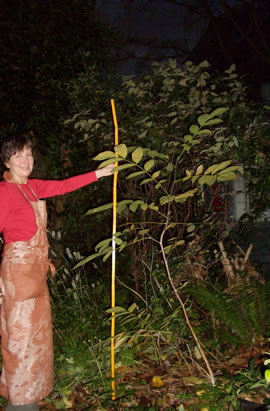
Urban planner Helga Fassbinder got an appointment as full professor at the TU/e in 1976 at the age of 34, becoming the first woman to reach that position. Even while still a student, she was able to prevent a complete demolition of the characteristic old residential area Kreuzberg in Berlin. In 1990, Fassbinder took the initiative for the Berlin city forum, in which residents, investors, civil servants, managers jointly considered the question of what Berlin should look like after the fall of the Wall. She carried out research into every conceivable aspect of urban renewal, and is currently working on launching the Biotope City Journal, a multi-language online magazine about the sustainable city. Interview in 2004
"I grew up in Heidelberg, a town with a population of no more than 100,000 at that time. It has Germany's oldest university, which has a major influence on the town. As far as family discussions about study choices and career possibilities were concerned, all the attention went to my brother. My parents were concerned about what he would decide to study. As a girl, by contrast, I was completely free to choose what I wanted to do. Nobody expected anything from me, and I could do as I liked. A bit of studying, whatever it might be, and then, she's sure to get married. At least, that was what they thought. Of course things were very different then. On the one hand I sometimes felt hurt, but on the other hand I always felt very privileged. Not troubled by expectations, no special attention: that gave me the freedom to do the things that fascinated me. But one thing my mother always impressed on me was the need to earn my own living.
I started my studies with history of art and history, those were subjects, in which I was totally interested. At first I didn't choose a technical subject at all. And at school I wasn't so good at mathematics either - probably because the teacher always said it was 'nothing for girls'. I remember once in a chess tournament I beat the mathematics 'wizkid' of the class, and the only thing the math teacher could say was that I just had a lucky day. Of course I was angry about that for a short time, but really it didn't bother me too much even then. I started architecture because after a while I found history of art too vague and with little relevance to everyday life. I missed the reality content: the move from the Roman to the Gothic building style also had a lot to do with new developments in building techniques, I thought, and not just with the emergence of a new religious awareness. When I started to study architecture, I suddenly found I was quite good at mechanics and also that I wasn't so bad at design. After graduating I switched once again, this time to urban planning. That was because I found it so annoying that when you were looking at an architectural design, you were just looking at that one building with hardly any attention to the context in which it was to be placed. I followed my architectural studies in Berlin, where I spent a lot of my first semester walking around the city. That's how I came across Kreuzberg - at that time a workers' area with attractive blocks of buildings with clean, straight lines from the end of the nineteenth century. I was shocked to see that one of those blocks had already been demolished and replaced by an ugly, modern apartment building. The same thing was planned for the whole area. I found that absolutely unbelievable! Returning to the department, I joined in lectures and seminars, telling people that we couldn't let this happen - and at the same time I suggested making alternative plans. Finally, I managed to persuade a group of students to take part in a demonstration in Kreuzberg. There we set up a kind of urban planning office, and developed an alternative plan for Kreuzberg. We weren't successful right from the start, but that changed in the second phase: the Berlin Senate's demolition plans were shelved. That was the time when I found that urban planning was largely a political matter. You can think up the best plans - but if you don't have any supporters in the community who are prepared to work on getting them implemented, then you won't get anywhere. I wanted to learn more about the political game, so I decided to study political science at the Free University of Berlin. At the same time I also had to go back to my architectural studies to complete all my courses and graduate, which meant a big, round-the-clock working effort. I wrote my thesis about urban renewal in Kreuzberg. I later found that it had become a sort of unofficial best-seller at German-speaking universities.
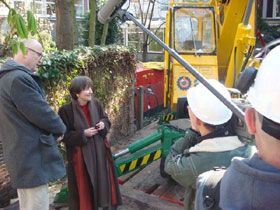 At that time far fewer women studied architecture than is now the case, certainly not much more than ten per cent. And I must say it never bothered me that I was a girl and most of the students were boys. I just did what I found important, what I thought had to be done: resisting the demolition plans! In fact, I didn't even notice that almost all of those who got involved in what I was doing were boys.
I never thought for a moment about career planning. While I was graduating I was so busy, I didn't have a minute to think about it, the only thing that mattered was communicating the message that demolition is wrong. To my great surprise, after graduating I was immediately offered a staff position at the TU/e � and that's how things went ever since. I hardly ever applied for a position on my own initiative, instead people approached me because they were interested in what I was doing. And I have to say, it's very satisfying to look back at that. Urban renewal has always been my obsession. That's what I published and lectured about; I even started a magazine. All the rest of my professional development was determined--and continues to be determined, because I still have a lot of things to say--by social problems and issues that are constantly coming up in my field. I decided to come to Eindhoven even though I received a number of offers of professorships, both while I was still working for my doctorate and afterwards. I found the Netherlands an extremely interesting country because of its highly developed urban planning system. And on top of that, what I was being offered in Eindhoven was absolutely unique: the first urban renewal chair anywhere in Europe.
As the first woman professor at the TU/e, I was the 'odd one out'. And I was just 34 when I was appointed, on average around 15 years younger than the other professors. At first, they didn't know what to make of me. But as time went by I became good friends with many of them and their wives.
In the beginning, I didn't have enough time to think about this unusual situation: I supervised 65 graduating students right from the start. So in my early years at the TU/e I spent a long time doing hardly anything except supervising graduation projects and reading theses the whole day long. They were great students, very much engaged, many of them supporting pressure groups that were fighting against the rigorous plans of their city councils. It was a tremendous, efficient, and socially responsible studying environment. From the very beginning, I also had an enthusiastic group of people around me - it was very friendly, without being too worried about the formal hierarchy. I found that very enjoyable. The 1970s and 1980s in the department were a really good time: things were much freer than they are today, and the department was driven by the engagement and enthusiasm of the students and teaching staff. It wasn't uncommon for newly graduated students to reach positions of responsibility very quickly, for example as project leaders in urban renewal areas. Gradually regulations restricted that freedom; more and more things were regulated, and became subject to formal targets and tests. Students were then forced to follow a tightly controlled study program, with little freedom for their own ideas, for individual interests, and social engagement to drive their studies. I thought that was a pity and not a wise development. Because at the end of the day it's your motivation that enables you to produce quality work, and not rules.
In recent decades, I have held a number of temporary positions as visiting professor at other universities. And although I could have left the TU/e for good, I didn't do that. I enjoyed working there, and I also had a great group of staff and students.
It's indeed true that as a women you have to be better than the men. But does that matter? Because you do your very best in any case, and if you're working on something that's close to your heart then it's no problem to do that. I've never found being a woman a disadvantage. I was an exception for a long time, and in a sense that's also an advantage. No need to play at 'being the boss', but just focusing on the real issues: when I did anything, it was always because it was something that really concerned me. In fact, I don't look back on the whole development of my activities over the years as a 'career': it was just a series of things that I did, and still do, with engagement because I found them important, and because I enjoyed doing them. I regard that as a privilege and consider myself very fortunate that I was always able to do that, right through my life and in all the positions that I have held." |
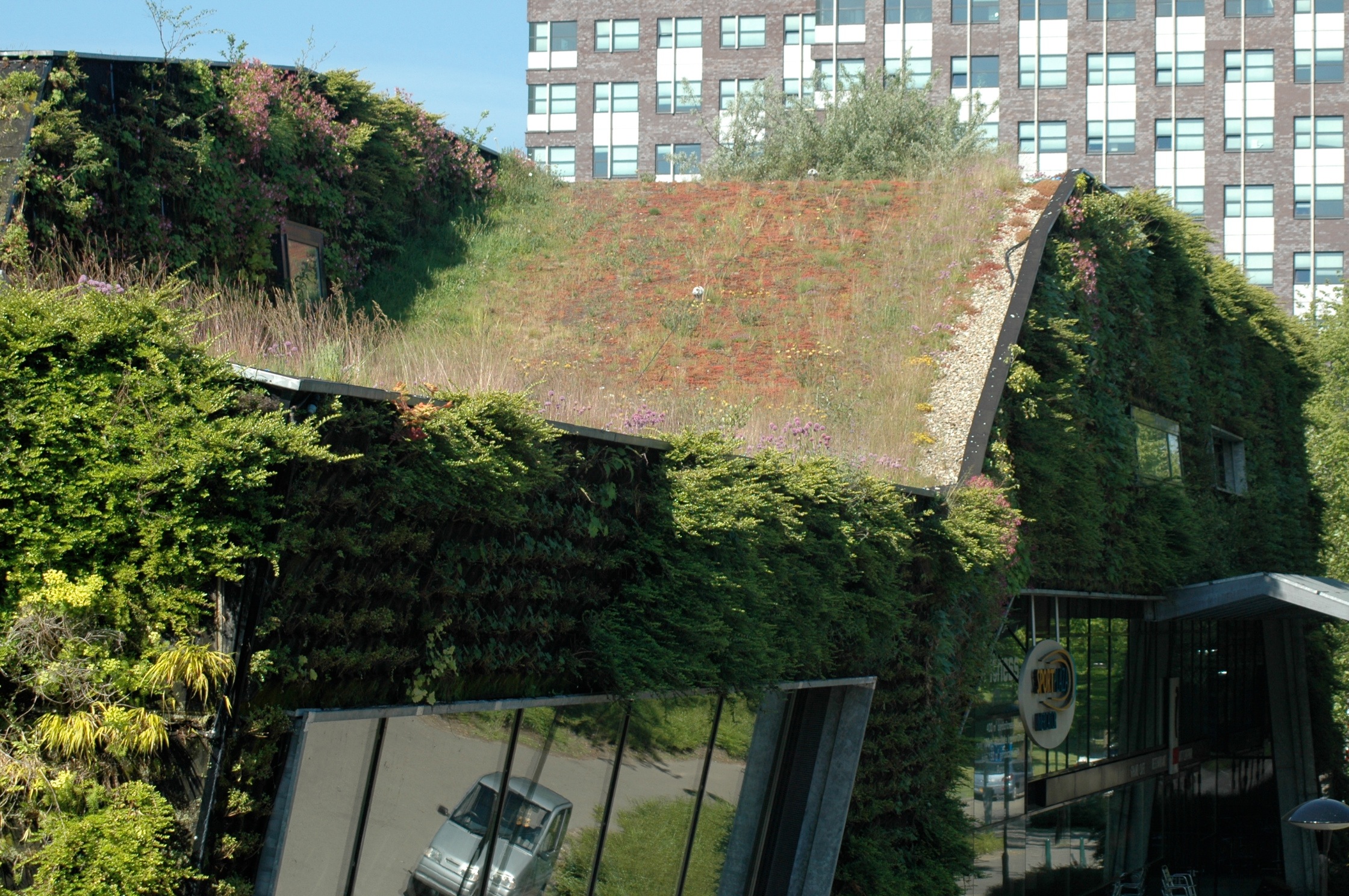

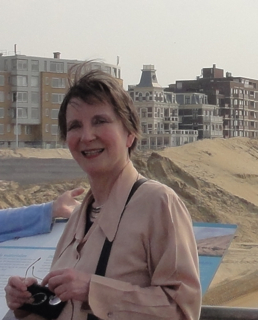
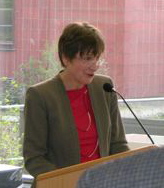 Geboren in Baden-Baden, aufgewachsen in Heidelberg, das humanistische Gymnasium besucht, sich an Griechisch, Latein und Hebräisch versucht.
Geboren in Baden-Baden, aufgewachsen in Heidelberg, das humanistische Gymnasium besucht, sich an Griechisch, Latein und Hebräisch versucht. 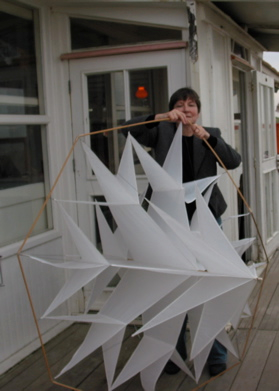 Nach der Assistentenzeit Forschung bei der Arbeitstelle Arbeiterkammer an der Universität Bremen über die Lebens- und Arbeitsbedingungen von Industriearbeitern in Bremen. 1975 Berufung als ord. Professorin an die Technische Universität Eindhoven, auf den ersten Lehrstuhl für Stadterneuerung in Europa. Aktiv in der europäischen Kampagne zur Stadterneuerung; vertrat die Niederlande in der Working Party Urban and Regional Planning der OECD in Genf zum Thema 'area based urban renewal'. Zwischenzeitlich Gastprofessorin in Berlin (HdK), Wien (Inst.f.Höhere Studien) und Leuven (Kath.Univers.); viele Vorträge im europäischen Raum. Forschung zu den Themen Wohnungsversorgung, Wohnungsbau, Stadterneuerung, Offenes Bauen, Urban Management, Wohnmilieudifferenzierung, Planungsstrategien.
Nach der Assistentenzeit Forschung bei der Arbeitstelle Arbeiterkammer an der Universität Bremen über die Lebens- und Arbeitsbedingungen von Industriearbeitern in Bremen. 1975 Berufung als ord. Professorin an die Technische Universität Eindhoven, auf den ersten Lehrstuhl für Stadterneuerung in Europa. Aktiv in der europäischen Kampagne zur Stadterneuerung; vertrat die Niederlande in der Working Party Urban and Regional Planning der OECD in Genf zum Thema 'area based urban renewal'. Zwischenzeitlich Gastprofessorin in Berlin (HdK), Wien (Inst.f.Höhere Studien) und Leuven (Kath.Univers.); viele Vorträge im europäischen Raum. Forschung zu den Themen Wohnungsversorgung, Wohnungsbau, Stadterneuerung, Offenes Bauen, Urban Management, Wohnmilieudifferenzierung, Planungsstrategien. 
